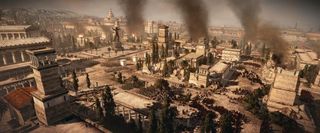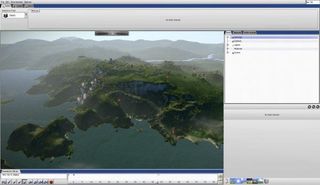Rome 2 lead designer talks ancient warfare, modding, DLC, and the importance of working with the community

PC Gamer: When you're got such a central and fascinating power as Rome in a game, how do you then make the other factions that surround Rome interesting to play?
James Russell: Well we're not ready to go into which factions are going to be in the game and which factions are going to be playable and that kind of thing. But you know, absolutely those kind of features will apply across the board in terms of the all the different factions that the player can enjoy. I mean it's part of what makes the Roman era so evocative is the sheer variety and exoticism of the different cultures that they encountered. And that's what's so exciting it's the setting, it's the huge scope of the world and all of the different cultures and civilisations that were part of it.
PC Gamer: And will that be reflected in political systems or unit fighting styles, things like that?
James Russell: Absolutely. There's a huge array of fighting styles and different methods of waging war, absolutely. We've got hundreds of units and that's part of what makes the combat in Rome so special and unique. There's a huge amount of variation in terms of fighting styles and just the look and feel of the different cultures.
PC Gamer: So what time period will be covered by the game?
James Russell: Well I don't want to get too specific but we are wanting to have the whole sweep of Roman history right from the early Republic all the way to the Imperial period. But we don't really want to talk about specific dates.
PC Gamer: Does it include the divided Empire? West and East?
PC Gamer Newsletter
Sign up to get the best content of the week, and great gaming deals, as picked by the editors.
James Russell: Well.... who knows?
PC Gamer: What are your plans for multiplayer this time around?

James Russell: Well I can't really talk about multiplayer, but I think I can say that we're planning to do something really big.
PC Gamer: Talking about Total War generally, there's a really varied amount of post launch content for Shogun, from small campaign packs to full expansions. Is that the policy going forward, to have a full range of DLC at different sizes?
James Russell: I think we're really lead by the content itself and by what fits. What we want to do is create a fantastic core release which has the huge array of variety that people expect from a Total War game, and in particular a Total War game set in ancient Rome where we include all of these other civilisations. So, yeah, we absolutely plan to delve deeper after release in terms of additional content. We're lead by the content, we don't develop and hold things back, that's not how we work. We make the best game we can and then we think "Okay what do the fans want? What do we want to do? How can we push this even further?"
PC Gamer: So with Shogun 2 did you find that a particular size of DLC or expansion worked better than anything else?
James Russell: I think they all have their place. I think there's a great place for smaller bits of DLC which add very specific content, there's a place for a new campaign and there's a place for a big expansion pack as well. I think they all have their strengths and weaknesses and we're happy with all the Shogun 2 post release content, yeah.
PC Gamer: So you've put out the map editor for Shogun 2 - should players expect similar modding support for Rome?
James Russell: Well, you know we do our best. It has become harder, in the old days we worked with very simple text files that were very easy to mod, now we have a proper authenticated database. We don't necessarily have all the editor tools that the players out there think we do. As designers we struggle as well.

PC Gamer: So do you look at the mod community, do you factor in what they're doing to your games after release and apply that to subsequent games?
James Russell: Well, you know, we keep ourselves aware of what's going on and what people want and we do our best to listen to the community.
PC Gamer: How does modding and community support work alongside DLC, where a game grows in the direction you're taking it in and the community independently does their own thing. What's the appeal of supporting modders when you've got your own plan for the growth of the game?
James Russell: Well the appeal of supporting modders is that it creates engagement, it supports engagement with the game and modders can increase the lifetime of the product by creating content that they want to play with each other. But I don't think we feel threatened by that in terms of producing our own content, we're confident about what we do and I think we make great DLC content. And there are things that we can do, because, we can change the code and so on, that the modders couldn't do.
PC Gamer: You've got a very dedicated community, and Total War Centre is a good example of the kind of focused community that springs up around PC games. Is that one of the big appeals of sticking with the PC - gaining access to that committed group of players?
James Russell: In terms of the platform I think there is something unique about what PC gaming is. Total War at it's heart is an epic, deep gameplay experience and I think PC is the best platform for that. It's that kind of 'lean in' experience, it's not on the sofa in the living room with shorter play sessions and so on. So we do want to make Total War accessible, we do want to support the ability to play for shorter amounts of time absolutely but I think at its core PC is a perfect platform for what Rome 2 is, absolutely.
Total War: Rome 2 is due in late 2013.
Joining in 2011, Chris made his start with PC Gamer turning beautiful trees into magazines, first as a writer and later as deputy editor. Once PCG's reluctant MMO champion , his discovery of Dota 2 in 2012 led him to much darker, stranger places. In 2015, Chris became the editor of PC Gamer Pro, overseeing our online coverage of competitive gaming and esports. He left in 2017, and can be now found making games and recording the Crate & Crowbar podcast.
Most Popular


